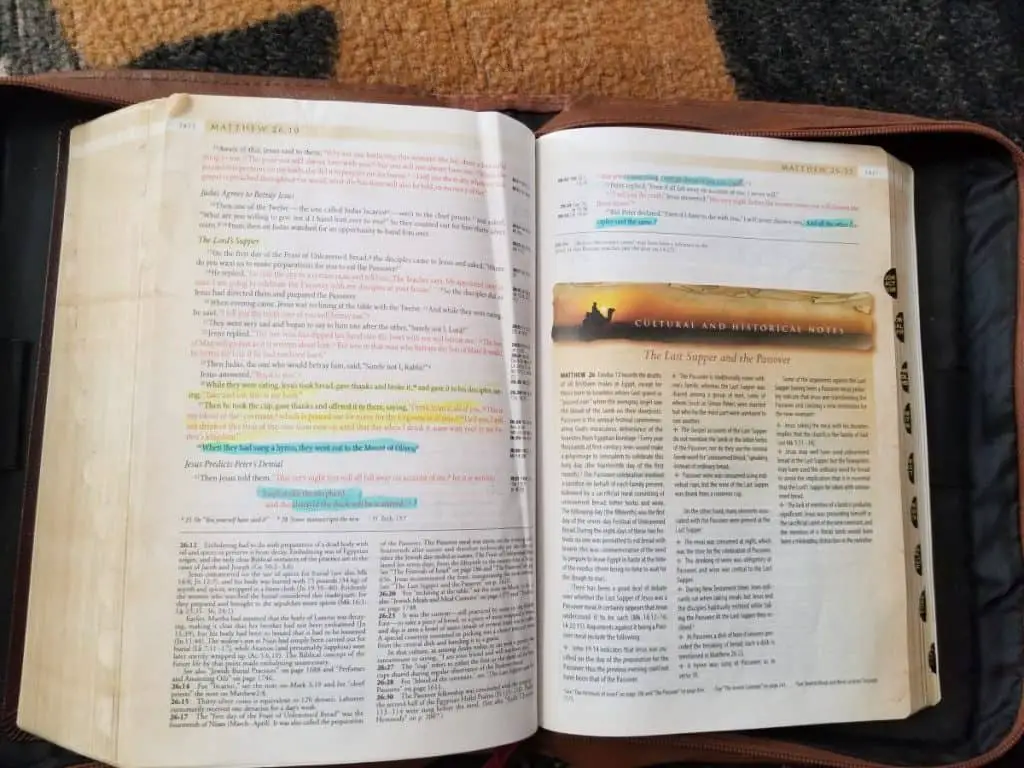Table of Contents
Is it a Sin To Write in the Bible – How to Write, Mark, and Highlight the Bible?
Is it a Sin To Write in the Bible – Is it Sin To Write, Mark, and Highlight the Bible? The Bible is the holy book that we read as Christians, and we want to be sure that we keep it in good condition. As Christians, we are to study the Bible so that we will understand what God is saying to us. While studying the Bible, it is normal for Christians to include markings as they read verses, and want to remember them later. The question many ask is: Is it a sin to write, mark, and highlight the Bible?
It is not wrong to put marks in your Bible as you have your devotion time with the Lord. God desires that we will understand His word and if writing, marking, and highlighting your Bible will help you, then go ahead. God does not take offense at you marking your Bible because you are not changing its content, you are only reading it and looking for the best way to memorize it.
The sin would be to change what the Bible says,
which is not possible for you because you cannot edit the copy you have. What God considers sin is adding or removing things in the Bible. “For I testify to everyone who hears the words of the prophecy of this book: If anyone adds to these things, God will add to him the plagues that are written in this book; and if anyone takes away from the words of the book of this prophecy, God shall take away his part from the Book of Life, from the holy city, and from the things which are written in this book” Revelation 22:18-19.

You Can Write, Mark and Highlight Your Bible
We are to read and meditate on the Word of God and as most of us do, it is normal to mark the verses we are reading. The Bible does not directly address writing or highlighting but it causes no harm to your Bible. Some people like to highlight different groups of verses with different colors depending on how they want to remember them. Others write some notes on the margins of the Bible so that they will not forget a revelation God gave them as they were studying the Word.
There also is a Bible Publisher that Published what is titled the “Rainbow Bible” It is Highlighted Separating Different Subject matters – Enriching your Bible study Time.
What is important is studying the Bible and not how you choose to highlight verses. Joshua 1:8 says, “This Book of the Law shall not depart from your mouth, but you shall meditate in it day and night, that you may observe to do according to all that is written in it. For then you will make your way prosperous, and then you will have good success” (Joshua 1:8).
Your Bible is your personal possession and you are free to mark it as you please. The things you highlight in your Bible are between you and God, and not for everyone else. What would be wrong is marking someone else’s Bible without their permission. Not everyone likes to put marks in their Bible and if they lend you theirs to read, the best thing you can do is respect them and not mark their copy.
In the Bible we don’t see the teachers of the law putting any marks on the Scriptures they used to read aloud. This is because they used documents that were for the public and not personal use. In those days, the Jews used to go to the synagogues to listen to the reading of the Word of God. These documents did not belong to any individual, and therefore no one had the authority to highlight anything.

IIs it a Sin To Write, Mark, and Highlight the Bible / use the Chronological Bible – I love all the Historical Notes they Provide the NIV version
Avoid Cluttering the Pages of Your Bible
Today, people have their personal copies of the Bible and are free to mark them as they please. Most of the time you are the one who reads your Bible and writes down what God is speaking to you. However, you don’t want to put too many markings that clutter the pages of your Bible. You can put short quotes or words on the sides and if there is more you want to write, you can put it in your journal instead. Too much writing in your Bible will confuse and distract you as you read it next time.
When I was in school, I purchased a Bible in Notebook form each, that way I could take out each page as we studied each chapter, and take notes, with highlighters, and different colored Pens.
If you have to highlight Bible verses, use a highlighter that will not soak into the page and prevent you from reading the backside. Choose a highlighter that highlights well but dispenses ink sparingly to avoid destroying the pages of your Bible and making them illegible.
Don’t include unnecessary marks because you want that clean feel every time you read your Bible. The reason people use journals when they are studying the Bible is that they have a lot to write down, and it may not fit in the pages of the Bible. As you do your devotions, always carry with you a journal to write the things God is speaking to you in detail.
Why Do We Think that Writing, Marking and Highlighting the Bible is a Sin?
Many of us grew up in religion and we learned that to please God we have to follow rules and regulations. A relationship with God was not emphasized and we were taught that God would be angry with us if we did wrong and He would punish us. This religious mindset of following rules is what drives our behavior as Christians today.
God is relational and His priority is to have a relationship with us. We are to obey His Word but not in the way religion presents it. God would rather speak to you by His Spirit and let you know what He wants you to do or not do. God is not angry with you or waiting to punish you for marking your Bible, He wants to make sure that you understand His Word.
You can write, mark, and highlight your Bible as God speaks to you and emphasizes certain Scriptures that He wants you to study. You are not sinning against Him because His desire is to help you understand His precious Word.
Concluding King Davis Shared in His Psalms, (Psalm 119: 98-100), says that “God’s Word Makes Him Wiser Than All His Teachers”
6 Reasons it is Not a Sin to Write in Your Bible
here is a table providing some reasons why writing in your Bible might not be considered a sin:
| Reasons Writing in the Bible Isn’t Considered a Sin | Explanation |
|---|---|
| Personal Reflection | Writing in your Bible can serve as a method of personal reflection and a way to remember how a certain passage impacted you at a certain time. |
| Aids Memorization | Writing notes or highlighting passages in the Bible can help aid memorization of scriptures. |
| Deepens Understanding | Writing notes or commentary next to scriptures can deepen understanding of the text and provide insights when revisiting. |
| Encourages Active Reading | Taking notes encourages active reading and engagement with the text, which can lead to a deeper understanding and application of its teachings. |
| Not Disrespectful | If done respectfully and with the intention of increasing understanding or connection to the scripture, writing in the Bible isn’t necessarily seen as defacing or disrespecting it. |
| Not Prohibited | There are no specific biblical passages that prohibit the act of writing in the Bible. Some argue that as long as the intent is to learn and grow in faith, it is permissible. |
As always, interpretations can vary widely depending on the individual, religious tradition, and cultural practices. Some people might still feel uncomfortable writing in their Bibles, and that’s perfectly fine. It’s a personal choice and there’s no one “right” way to study and reflect on scripture.
6 Thoughts Why you Shouldn’t Write in your Bible
Sure, here are six reasons why some people might choose not to write in their Bibles:
- Preservation: Some people see their Bible as a sacred object to be preserved in its original state. They might feel that writing in it would deface or degrade it.
- Respect: The Bible is viewed by many as the Word of God. Out of respect for this divine communication, some people prefer not to alter it with their own handwriting or markings.
- Passing Down: Many people pass their Bibles down through generations as a family heirloom. They might want to keep the text unmarked for future generations to read it as it was.
- Distraction: For some, annotations and highlights can be a distraction when they’re trying to read or meditate on the scriptures. They might prefer a clean, unmarked text for easier reading.
- Evolution of Understanding: Our understanding and interpretation of scripture can change over time. Some people prefer not to write in their Bibles so they’re not influenced or confined by their past interpretations when they revisit a text.
- The Bible’s Holiness: The holiness of the Bible, for some, extends to its physical form as well. They might see writing in it as an act of desecration or disrespect, even if that’s not the intent.
It’s important to remember that the decision to write or not write in one’s Bible is a deeply personal one, often influenced by individual, religious, or cultural factors. There’s no universally right or wrong approach—it’s about what feels respectful and helpful to the individual reader. is it a Sin To Write in the Bible

Let Us All Become Wise – God Bless Greg



